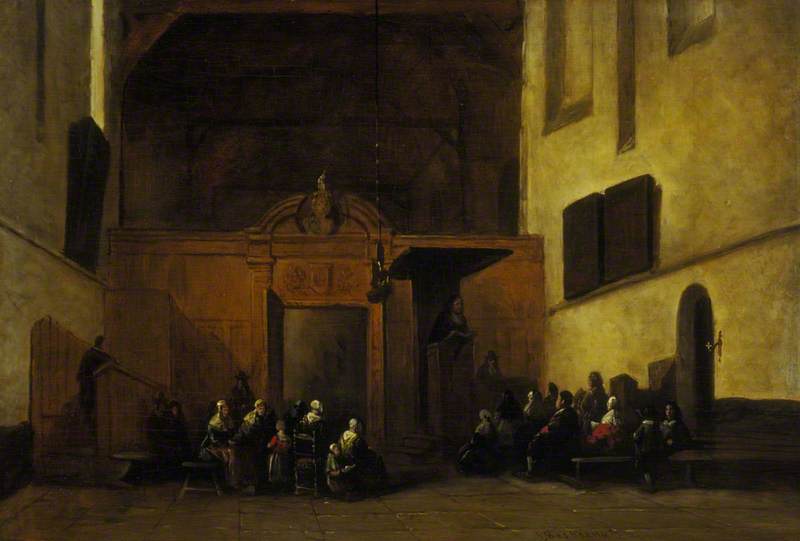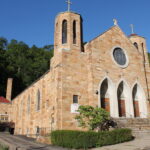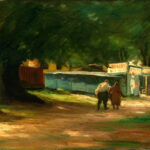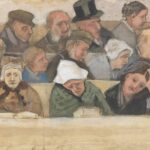Let a man so account of us, as of the ministers of Christ, and stewards of the mysteries of God. Moreover, it is required in stewards, that a man be found faithful.
I Corinthians 4:1-2
We count them happy which endure.
James 5:11a
The sun sits long on its porch. An outdoor sermon follows dinner on the grounds. Then, a handful of kids and young people gather on the back lawn of the church to play oversized volleyball. They have enough light to play several sets. They play under the guidance and with the participation of the church’s pastor who, though in his sixties, will move, dive, coach, strategize, despair loss, and cheer victory with an enthusiasm and agility that surpasses some of the young people’s and most of the kids’ effort and skill. A few young adults join in, taking sides across the volleyball net that hangs between metal poles sunk in tires filled with concrete, and the games really get going. Soon, the smaller children drift away to play tag or make-believe, while those who remain on the grass court play as if the sun will stay up forever and nothing else matters in the world. And, still, perhaps no one gives over to the moment more than the church’s pastor, Rick Setser.
Thirty years earlier, though, Rick had more kids and young people attending such events. More adults, too. As youth pastor of a large church in Florida, he had a hundred-plus teenagers show up for church services. Just under that many followed him to summertime church camps. But as “way leads onto way,” even when following the call of God on your life, this man came to West Virginia to lead a rural mountain church in need of a pastor. The congregation grew. Never a large fixture, like a few churches in the area; certainly not a mega church. Yet full, brimming, bright. Those days may return. For now, like so many churches across the country, people have dropped their church attendance, replacing it, for reasons upon reasons, with other things. This rural church pastor and his congregation beat on, but the lack of attendance can be seen and felt like Carl Sagan’s tragic poem “Buffalo Dusk”:
The buffaloes are gone.
And those who saw the buffaloes are gone.
Those who saw the buffaloes by thousands and how they pawed the prairie sod into dust with their
hoofs, their great heads down pawing on in a great pageant of dusk,
Those who saw the buffaloes are gone.
And the buffaloes are gone.
Taking a wide view, the Center for Civil Society hosted a webinar entitled “The Nones: the threat the decline in worship poses to civil society.” As its title suggests, the more people cut themselves off from worship, the less a society can remain civil. It is a sentiment Rick Setser agrees with. In a recent three-part series called “Religion in the Heartland,” writer and pastor Brian Boyce contemplates this phenomena, focusing primarily on rural churches. While Boyce contends that the reasons for people leaving churches are complex, he makes sure to note the overwhelming involvement in social media communities as opposed to voluntary, in-person gatherings, and he suggests that some who leave church may “associate religion too closely with an older way of life.” However, Boyce spends one article looking at what he considers the three main causes for church abandonment or attendance. He calls them the “Three Ps”—Property, Politics, and Pastors.
To that point, during a Wednesday night Bible study, this Pastor Rick spoke on the Old Testament book of Malachi. One group Malachi dresses down in that text is the priesthood. The religious leaders profaned God’s commandments; the people, consequently, lost the desire to go to the temple. Today, not much has changed in human nature. Religious leaders who distort Scripture to suit their needs, religious leaders who fail to discipline themselves, religious leaders who fall derelict of their office yet somehow keep a group of followers. But such leaders cut the hearts of those who follow God, and they spit in the very face of God. This rural church’s pastor, however, holds with reverential fear God’s house and its people. Though rhetorically not for everyone—who is?—this pastor has kept his lot away from those whom Malachi brandished as corrupt. Pastor Rick has not dealt treacherously with God’s covenants.
As far as church attendance goes, Pastor Rick speaks to the issue from the pulpit, in leadership meetings, and at the kitchen table in his home. He does not conflate attendance with salvation or sanctification. But empty pews can neither be saved nor sanctified. They never serve in the nursery or children’s services. They never teach Sunday school or tithe. They bring no food for potluck. They do not pray. They do not worship. However, this rural church pastor understands the complexities around the emptying of churches. He has adjusted to natural and cultural strains, for example, by providing a streaming service for those not physically present. But should the people come back in droves, or should new souls join the congregation, this church, like all churches, is like a half-way house. None of us aren’t sinners. Yes, maturity exists. Sanctification shows its handiwork. But while Flannery O’Connor’s claim that a good man is hard to find is true, even “the best of men are but men at best.” This is not lost on Pastor Rick. Fortunately, he has proven himself a “workman that needeth not be ashamed, rightly dividing the word of truth.” He shoulders many of the rural church’s squabbles and small conflicts among the congregants. He shoulders those harder things that punch the wind out of mortals, reminding us of our mortality, calling us to depend so much more on God. Harder things like illness, poverty, job loss, divorce, abuse, addiction, and death have kicked this rural church. In addition, Pastor Rick also knows quite well those who, like the congregation in the 2014 film Calvary, seem dedicated to living as dead men, wholly given to sin, while attending the house of God, even if only sparsely, to assuage some guilt, satisfy seasonal expectations such as Christmas and Easter, eat free meals during dinner on the grounds, appease church basketball league rules, or even simply to see and be seen, to talk and never listen. Pastor Rick has taken their confessions, as Protestants do. He has heard the false promises and the brash rejections made by those who handle the days of grace with ignorant defiance.
Nevertheless, this pastor fills his post. On Sundays he can be found at the pulpit, and he’d like more people to sit closer to the pulpit and not the back half, or third, or fourth, or fifth of the auditorium. And, unlike the fictional pastor, Dr. Philip Gottschall, from David Rambo’s play God’s Man in Texas, he is gracious with his pulpit and exhorts those who do well there. Throughout the week, he can be found studying at his desk for the messages he delivers on Sundays and Wednesdays. He can also be found on the roads, lanes, highways, and hedges, paying visits to those homebound or estranged from church; he can be found at each construction project the church has, from repaving the parking lot to emptying water out of the flooded basement to adding the extension to the nursery and a kitchen to the fellowship hall; he can be found on Christmas Eve with me in the crawlspace of my home, thawing and repairing frozen pipes. The service he has given over the years to this church and to his family cannot be measured. Our cups run over.
Fundamentally, concerning the trend of empty pews, Pastor Rick stands on the old wisdom found in the book of Hebrews of “not forsaking the assembling of yourselves together as the manner of some is … and so much the more as you see the day approaching.” He has not forsaken the assembling. Even as he approaches the evening of his pastorate, the sun appears unwavering; his faith seems to not have waned, the works of his faith, too.
Image credit: “The Preacher” via Wikimedia Commons





